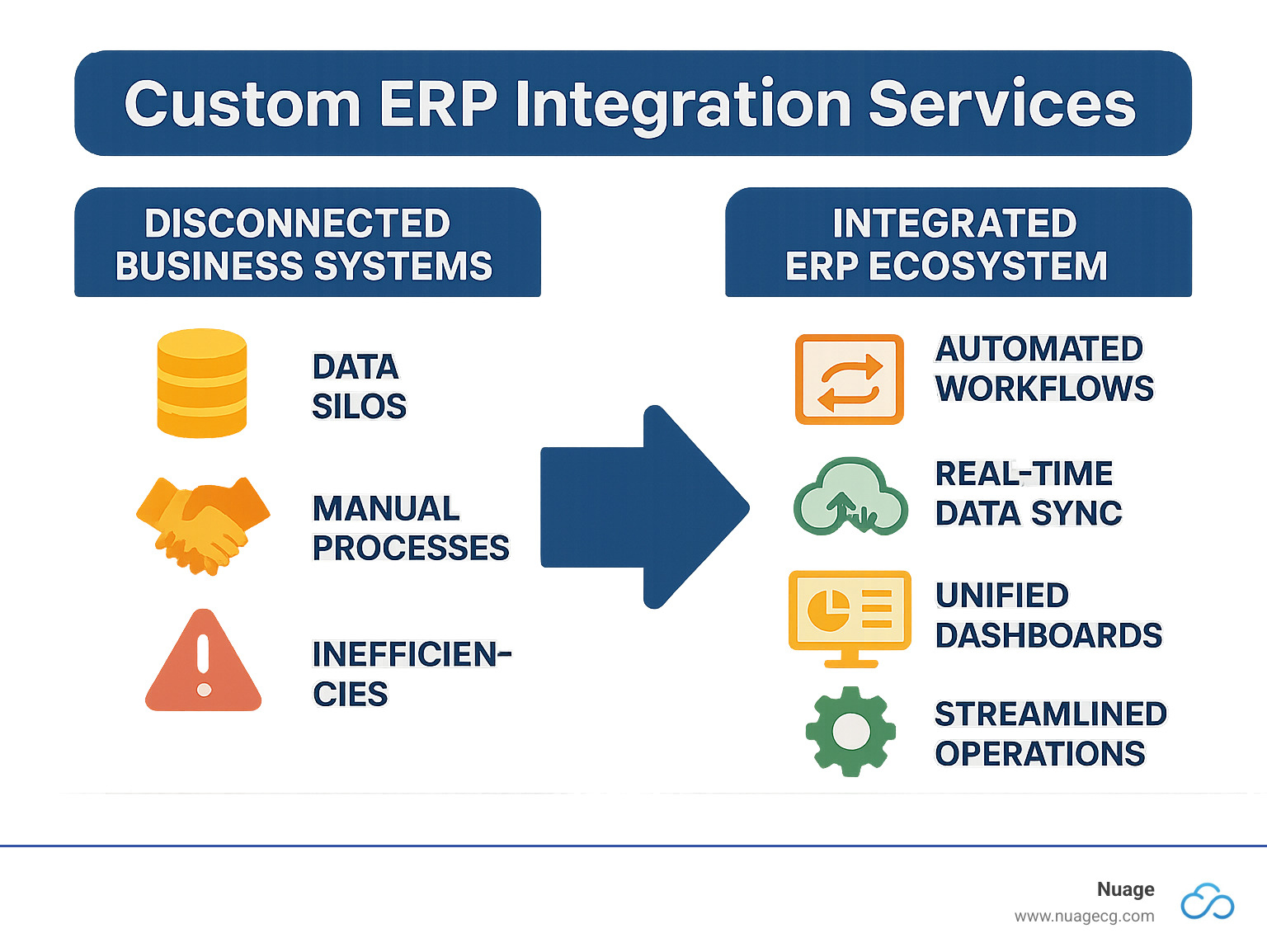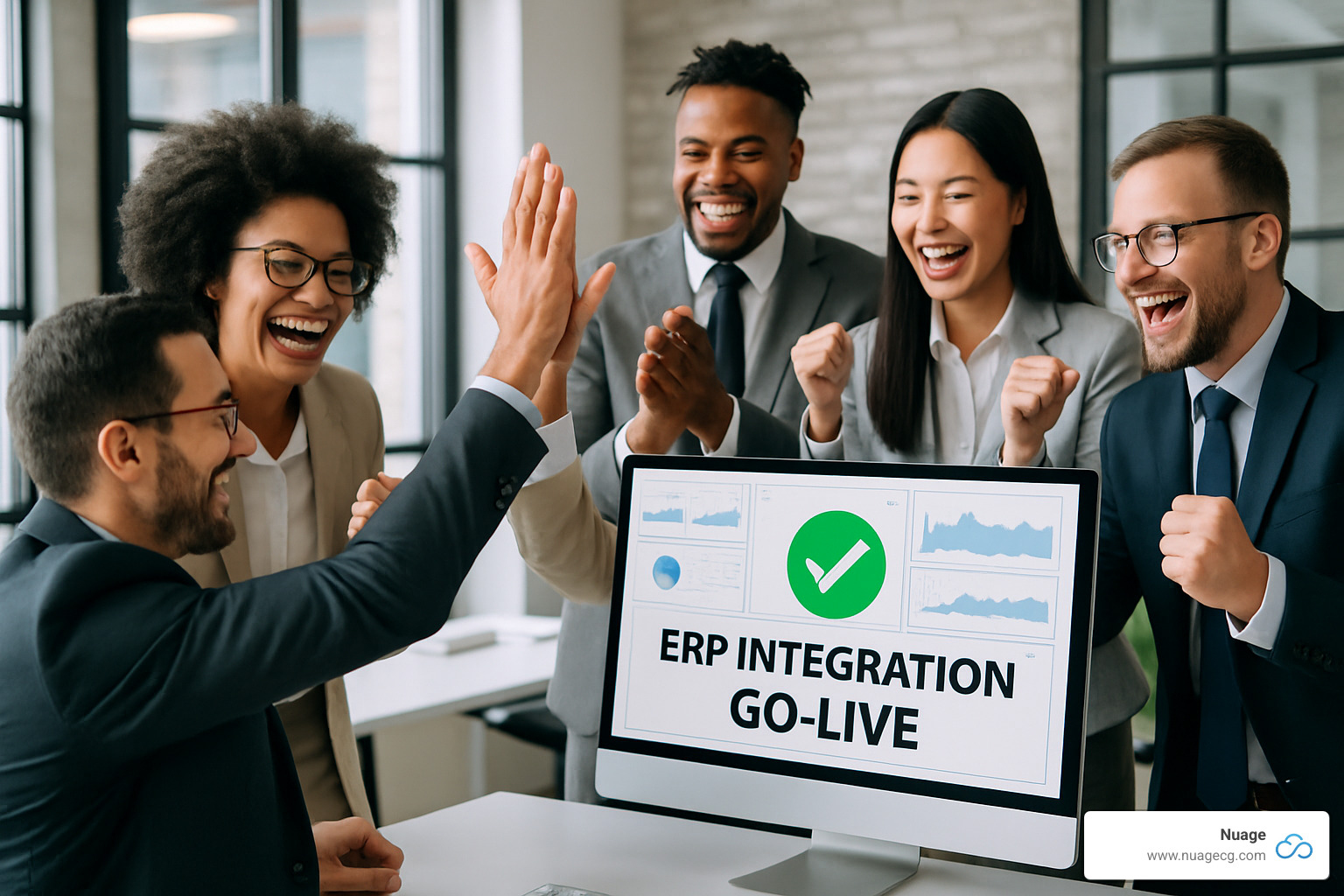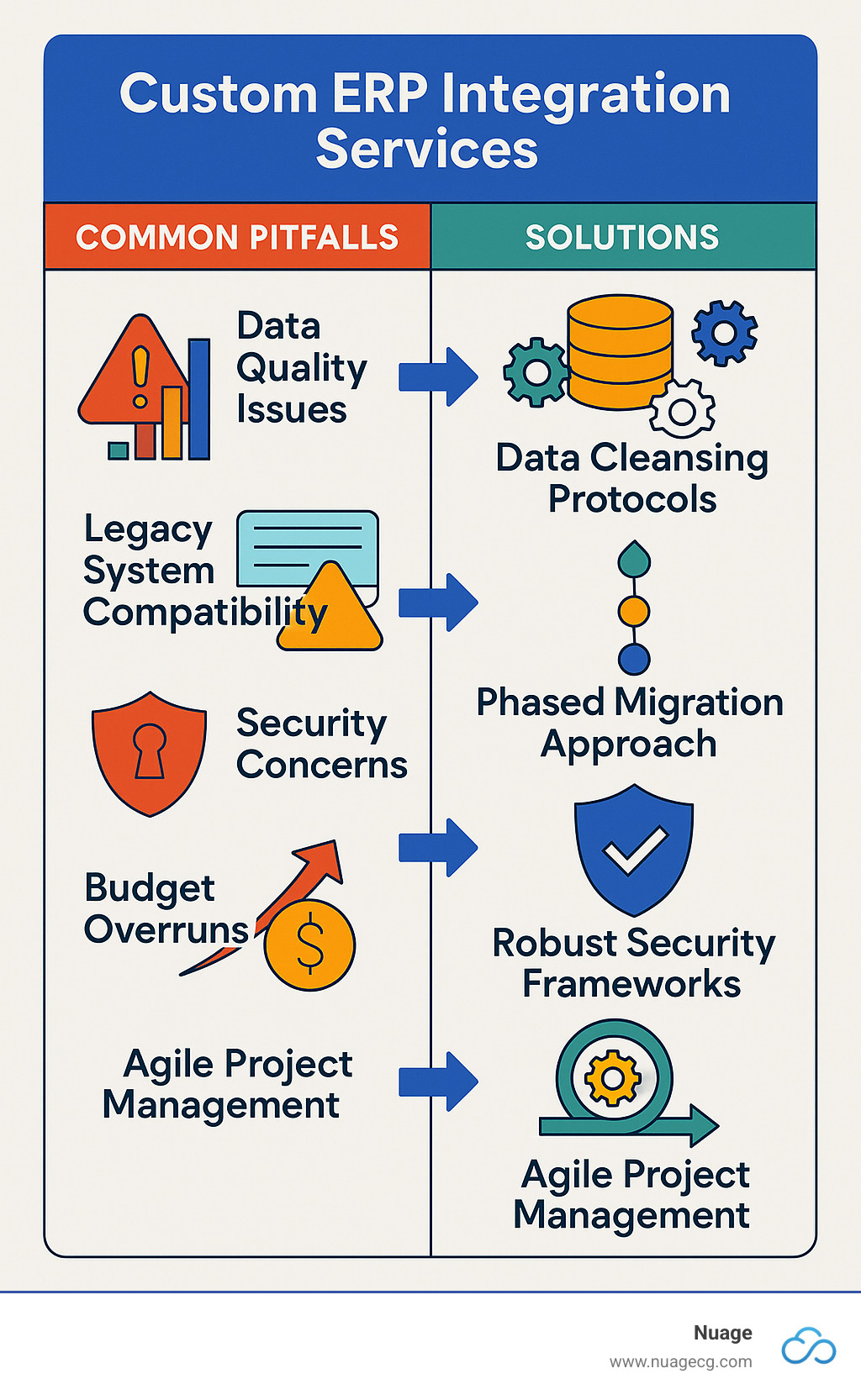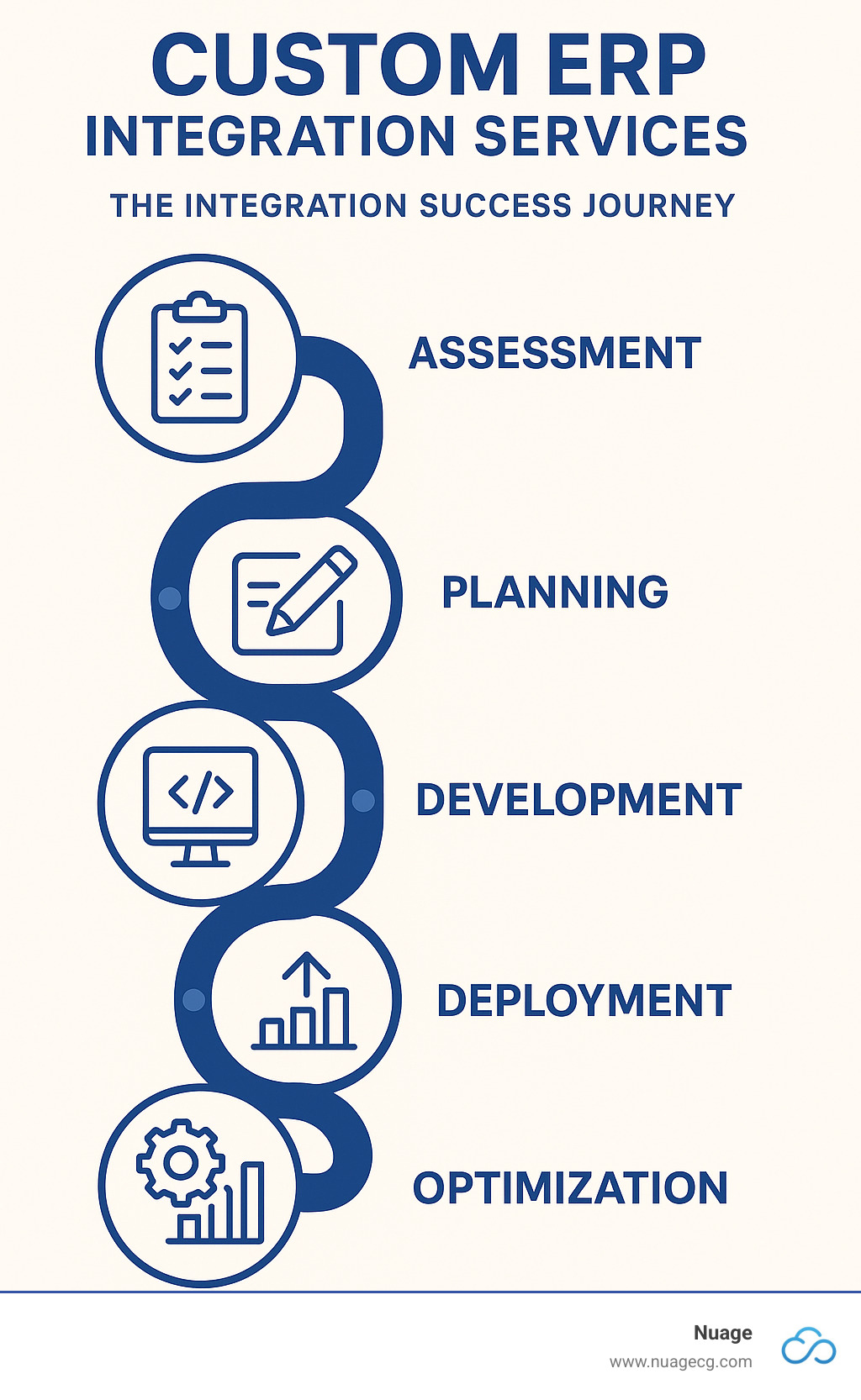Why Custom ERP Integration Services Are the Key to Open uping Your Business Potential
Custom ERP integration services connect your ERP system with other business applications through custom solutions that enable seamless data flow and process automation. Here’s what you need to know:
What they include:
– Custom API development and middleware solutions
– Real-time data synchronization between systems
– Automated workflow orchestration across platforms
– Legacy system modernization and connectivity
Key benefits:
– Eliminate data silos – Create a single source of truth across all systems
– Boost efficiency – Automate manual processes and reduce duplicate data entry
– Improve decision-making – Access real-time insights from unified dashboards
– Scale with growth – Connect new applications as your business expands
When you need them:
– Your business uses multiple disconnected software systems
– Manual data transfers are slowing down operations
– You need real-time visibility across departments
– Compliance requires integrated audit trails
Most businesses only scratch the surface of their ERP’s potential. The real magic happens when your ERP talks to every other system in your organization. Companies like Fayman Group USA saved over $50,000 annually after implementing customized KPI reporting through ERP integration, while TruBeauty Concepts achieved 99% faster order processing.
Whether you’re running NetSuite or , custom integrations transform isolated software into a unified business engine.
I’m Louis Balla, and I’ve spent over 15 years helping companies bridge the gap between their ERP systems and the rest of their technology stack through custom ERP integration services. As CRO at Nuage, I’ve seen how the right integrations can open up changeal growth for businesses ready to move beyond basic ERP functionality.

What Are Custom ERP Integration Services and Why They Matter
Custom ERP integration services are specialized solutions that create seamless, automated connections between your ERP system and all your other business applications. Instead of having islands of data scattered across different platforms, these integrations create a unified ecosystem where information flows automatically from one system to another.
Think of your ERP as the conductor of an orchestra. Without proper integration, each musician (your various software systems) plays their own tune, creating chaos. But with custom ERP integration services, that conductor can coordinate every instrument to create beautiful, harmonious music – or in business terms, smooth, efficient operations.
The magic happens when your systems start talking to each other in real-time. When a customer places an order on your website, it automatically updates your NetSuite inventory, triggers your fulfillment process, and sends confirmation emails – all without human intervention.
Want to see how the platform itself describes these capabilities? Oracle’s official NetSuite ERP overview highlights the open-API framework that makes deep integrations possible. Likewise, the team at outlines how its composable architecture supports plug-and-play connectivity.
Difference Between Custom, Native, and Out-of-the-Box Integrations
Native integrations are like the apps that come pre-installed on your phone. Your ERP vendor has already built these connections to popular software; they’re tested and ready to go. The upside? They’re usually quick to set up. The downside? You’re limited to whatever your vendor decided to include.
Out-of-the-box integrations are pre-built solutions from third-party providers that connect common software combinations. They offer more flexibility than native options but still follow predetermined rules that might not match exactly how your business operates.
Custom integrations are built specifically for your unique needs. Custom connectors can handle your specific business logic, unique data requirements, and complex workflows that no pre-built solution could anticipate. Whether you’re running or NetSuite, custom integrations can adapt to your exact processes.
When Do You Need Custom ERP Integration Services?
- Growth pain points are often the first indicator. When your business expands beyond what standard integrations can handle, you’ll start hitting walls. Maybe your e-commerce platform needs to sync with multiple warehouses, or your manufacturing processes require real-time updates from shop-floor systems.
- Multi-app stack complexity is another major trigger. If you’re juggling ten or more different software applications, you’re likely spending too much time on manual data transfers and reconciliation.
- Compliance triggers can’t be ignored, especially in regulated industries. Pharmaceutical companies need specialized connections between their ERP and quality management systems to maintain FDA compliance. These aren’t nice-to-have features – they’re business-critical requirements that standard integrations rarely address.
Tangible Business Benefits of a Fully Integrated ERP Landscape
The moment you connect all your business systems through custom ERP integration services, something magical happens. We’ve seen companies eliminate 40+ hours of manual processing per week, achieve 99% faster order processing, and save tens of thousands of dollars annually through automated workflows.
When your ERP system talks to every other application in your business, automation becomes your tireless digital workforce. Picture this: a customer places an order on your website at 2 AM. Within seconds, your integrated systems check inventory, reserve stock, calculate shipping costs, update accounting records, and send confirmation emails – all while you’re sleeping.
Data accuracy jumps through the roof because you’ve eliminated the biggest source of errors: humans copying information between systems. When a customer updates their address in your portal, it instantly appears everywhere – your ERP, CRM, shipping system, and billing platform all stay perfectly synchronized.
Data Accuracy & Decision-Making Superpowers
Manual data transfer processes introduce errors in 5-10% of transactions. When you eliminate duplicate entry through integrated systems, you’re not just saving time – you’re creating a foundation of trust in your data.
Predictive analytics becomes incredibly powerful when fed by clean, synchronized data streams. Your NetSuite or system can spot patterns that would be invisible in disconnected systems.
AI insights take on a whole new dimension when your systems work together. Modern ERP platforms can predict demand fluctuations, optimize inventory levels, and even flag potential cash flow issues before they become problems.
For deeper insights on maximizing these benefits during implementation, our ERP Deployment Best Practices guide covers the essential steps.
Boosted Efficiency Across the Organization
Order-to-cash speed transforms from days to minutes when systems work together seamlessly. Credit checks happen automatically, inventory gets allocated instantly, and invoices generate without human intervention.
Customer experience reaches new heights when your service team has complete visibility into every customer interaction from one screen. No more putting customers on hold while representatives hunt through multiple systems.
Cost savings add up quickly across all these improvements. Less manual work means lower labor costs. Fewer errors mean reduced rework. Better inventory management reduces carrying costs while improving service levels.
The Custom ERP Integration Process: From Findy to Continuous Improvement
When we talk about custom ERP integration services, we’re talking about a complete change of how your business operates. Our methodology follows agile development sprints that deliver working functionality every 2-4 weeks, so you’re getting value throughout the entire journey.
| Approach | Timeline | Risk Level | Business Value Delivery |
|---|---|---|---|
| Waterfall | 6-12 months | High | End of project |
| Agile Sprints | 2-4 week cycles | Low | Continuous |
Phase 1 – Findy & Scoping
We start with stakeholder interviews that go beyond typical “what are your requirements” conversations. We want to understand the real pain points, the workarounds people have created, and the dreams they have for how things could work better.
Process mapping documents not just how things are supposed to work, but how they actually work in the real world. We map the edge cases and exceptions because if we don’t account for them, your integration will break the first time something unusual happens.
Risk assessment helps us look around corners and identify potential roadblocks before they become project killers. We evaluate everything from data quality issues to security requirements to organizational change challenges.
Phase 2 – Build & Test with NetSuite API
If you’re running NetSuite, you’re in luck. NetSuite’s API architecture is incredibly robust and gives us multiple ways to create the exact integration your business needs.
We leverage SuiteTalk for comprehensive access to NetSuite’s data model and business logic. RESTlets give us the flexibility to handle more complex business logic and unique API requirements.
Sandbox validation is absolutely non-negotiable in our process. Every single integration gets thoroughly tested in a sandbox environment that mirrors your production setup.
If your technical team wants to dive deeper, our NetSuite API Integration guide has all the technical details.
Phase 3 – Go-Live, Training, and Support

The go-live phase uses a phased rollout approach that minimizes disruption to your business. We deploy during low-activity periods with our technical team standing by to address any issues immediately.
Change management is one of the trickiest parts of any integration project. We work closely with your team to develop training programs that help people understand why new functionality makes their work easier.
KPI tracking starts the moment we go live and continues throughout our support relationship. We establish baseline measurements before integration and track improvements in processing time, data accuracy, and business outcomes.
Overcoming Common Custom ERP Integration Challenges
After helping companies through over 200+ ERP deployments and 1000+ third-party integrations, we’ve learned that it’s not about avoiding challenges entirely. It’s about knowing they’re coming and having the right game plan to tackle them head-on.

The four biggest challenges we see consistently are legacy system compatibility, messy data quality, security and compliance requirements, and keeping budgets on track. Each one can derail a project if you’re not prepared, but they’re all manageable with the right approach.
Bridging Legacy Systems with Modern ERP Platforms
Working with legacy systems requires a blend of technical skill and business understanding. These older platforms often contain decades of refined business logic and historical data that simply can’t be recreated overnight.
ETL tools become your best friends when moving data from legacy systems to modern ERPs like NetSuite or . The Extract and Load parts are usually straightforward, but the Transform step is where the magic happens.
Custom adapters act like translators between old and new systems. These custom-built components expose legacy functionality through modern interfaces, so you can gradually modernize without shutting down the business.
Phased migration recognizes the reality that you can’t always rip and replace legacy systems overnight. We design integration architectures that let old and new systems work together harmoniously while you gradually shift functionality to newer platforms.
For organizations tackling major system overhauls, our comprehensive ERP Implementation guide walks through proven strategies for managing these complex transitions.
Security & Compliance Considerations
Security in integrated environments is like conducting an orchestra – every instrument needs to play its part perfectly, and they all need to stay in sync.
Role-based access controls ensure that people can only see and do what they’re supposed to, even when working across multiple integrated systems. Encryption protects your data whether it’s sitting in a database or traveling between systems.
Audit trails get more complex when one action can trigger changes across multiple systems. Comprehensive logging needs to track not just what happened, but how actions flowed through your integrated workflows.
Continuous monitoring keeps watch over your integrated environment 24/7, detecting and responding to potential threats across all connected systems.
Cost, ROI, and Future-Proofing Your Investment
The investment in custom ERP integration services isn’t just about upfront costs. The real question is whether your integration will still be serving your business well in five years, or if you’ll be looking for a replacement because your needs have outgrown your solution.
Total cost of ownership tells a different story than initial price tags. While custom integrations typically require a higher upfront investment, they often deliver better long-term value through reduced licensing fees and the flexibility to adapt without starting from scratch.
The licensing versus development trade-off becomes particularly interesting as your business grows. Many pre-built integration platforms charge per user or per transaction, which can create nasty surprises as your team expands. Custom solutions typically have fixed costs that don’t punish you for success.
How Custom ERP Integration Services Scale with Your Business
The scalability question is where custom integrations really shine. We’ve seen too many businesses paint themselves into corners with integration solutions that worked perfectly for their current needs but couldn’t adapt as they grew.
Microservices architecture is like having a toolbox where each tool can be upgraded independently. Instead of replacing your entire integration platform when one component needs improvement, you can modify just the pieces that need to change.
Modular connectors allow you to add new systems to your integration ecosystem without disrupting existing workflows. When you acquire a new company or adopt a new software platform, you can build connections to your existing integration framework.
Multi-subsidiary growth often catches businesses off guard. What works for a single entity can become incredibly complex when you’re managing multiple companies, currencies, and regulatory environments. Custom integrations can be architected from the beginning to handle this complexity.
The beauty of modern ERP platforms like NetSuite and is that they’re designed to support these scalable integration architectures. The key insight from our 20+ years in digital change is that businesses that invest in scalable integration architectures early tend to outperform those that take a “we’ll cross that bridge when we come to it” approach.
How to Select the Right Custom ERP Integration Partner
Finding the right partner for your custom ERP integration services project isn’t just about technical skills – it’s about finding a team that truly understands your business and shares your vision for success. The wrong partner choice is often more costly than the wrong technology choice.
Start with technical expertise, but don’t stop there. Yes, you need a partner with deep knowledge of your ERP platform – whether that’s NetSuite, , or another system. But technical skills without business understanding often lead to technically perfect solutions that don’t actually solve your problems.
Industry experience can be a game-changer, especially if you’re in a regulated industry or have unique operational requirements. Look for proven methodologies that balance thorough planning with flexible execution.
Security posture has become non-negotiable in today’s threat landscape. Your integration partner will have access to your most sensitive business data, so their security practices need to be bulletproof.
Post-go-live support capabilities often separate good partners from great ones. Integration isn’t a “set it and forget it” solution – systems evolve, business needs change, and optimizations become possible over time.
Questions to Ask Potential Vendors
How do you approach project methodology? Look for partners who use agile development practices that deliver working functionality in short sprints. Be wary of anyone who wants to disappear for months and deliver everything at once.
What’s your security framework? You want to understand their specific security protocols, certifications, and how they handle sensitive data during development and testing.
Who owns the custom code? You should own the intellectual property for custom integrations built for your business. Understanding this upfront prevents conflicts later.
How do you handle scope changes? Every integration project encounters unexpected requirements. The best partners have clear processes for managing scope changes while keeping projects on track.
What does ongoing support look like? Integration support goes beyond just fixing bugs. You want a partner who can help optimize performance, add new functionality, and adapt to changing business requirements.
If you’re ready to start evaluating integration partners for your business, our team at Nuage would love to discuss your specific requirements. You can reach us through our Contact Us page to begin the conversation.
Frequently Asked Questions about Custom ERP Integration Services
What systems can be integrated with my ERP?
Here’s the exciting truth: almost any business system can connect to your ERP if there’s a will (and a way). I’ve been helping companies bridge their technology gaps for over 20 years, and I’m constantly amazed by what’s possible when you think creatively about integration.
The most common systems we integrate include CRM platforms like Salesforce and HubSpot, e-commerce sites like Shopify and Magento, payment processors, inventory management tools, and specialized industry applications. If your business uses it and it handles data, chances are we can make it talk to your ERP.
NetSuite is particularly integration-friendly with its robust SuiteTalk API that can connect to hundreds of different applications. offers similar flexibility with especially strong capabilities for manufacturing and service industry connections.
Even those stubborn legacy systems from the 1990s aren’t deal-breakers. We use ETL tools, database connections, and sometimes good old-fashioned file transfers to bring them into the modern world. The key is finding the right approach for each system’s unique personality and your business needs.
The real question isn’t whether something can be integrated – it’s whether it should be integrated based on your business priorities and budget.
How long does a custom ERP integration project take?
This is like asking “how long is a piece of string?” – but I’ll give you some realistic timeframes based on our experience with hundreds of integration projects.
Simple integrations connecting one system with straightforward data flows typically take 4-8 weeks. Think connecting your e-commerce platform to automatically create sales orders in your ERP.
Moderate complexity projects involving multiple systems or custom business logic usually run 3-6 months. This might include integrating your CRM, inventory system, and accounting software with complex approval workflows.
Complex enterprise integrations with legacy systems and extensive customization can take 6-12 months. These are the projects where we’re essentially rebuilding how your entire organization handles data.
Here’s what I love about our agile approach: you’ll see working functionality within the first few weeks, even on complex projects. This means you start getting value before the entire project wraps up, rather than waiting months for a “big bang” deployment.
The biggest factors that influence timeline are data quality (messy data takes longer to clean), system complexity, custom business logic requirements, and how quickly your team can make decisions during the process.
What is the difference between middleware and API-based integrations?
Think of this like the difference between having a translator at a international business meeting versus everyone speaking the same language fluently.
API-based integrations create direct connections between systems using their native “languages.” Your CRM talks directly to your ERP using APIs both systems understand. This approach typically gives you better performance, faster response times, and fewer things that can break. It’s neat when it works.
Middleware solutions act like that skilled translator, sitting between systems and helping them communicate even when they don’t speak the same language. Middleware is particularly valuable when you’re dealing with older systems that don’t have modern APIs, or when you need to orchestrate complex workflows across multiple applications.
For example, if you need a customer order to trigger updates in your ERP, then flow to your warehouse management system, update your customer portal, and send notifications through your CRM – that’s where middleware really shines.
Most successful custom ERP integration services use a hybrid approach. We leverage direct API connections where they make sense and use middleware for the more complex orchestration work. It’s about choosing the right tool for each specific job rather than forcing everything into one approach.
The choice often comes down to your specific systems, performance requirements, and long-term integration strategy. That’s where our 20+ years of experience helps – we’ve seen what works (and what doesn’t) across hundreds of different scenarios.
Conclusion
The journey from scattered, disconnected systems to a fully integrated ERP ecosystem isn’t just about technology – it’s about open uping your business’s true potential. Custom ERP integration services represent one of the most powerful opportunities for operational change available to modern businesses.

At Nuage, we’ve had the privilege of guiding organizations through this change for over 20 years. What we’ve learned from hundreds of implementations is that the real magic happens when technology serves your unique business goals, not the other way around.
Your roadmap to unified operations starts with an honest look at where you are today, a clear vision of where you want to be, and a practical plan to get there. Whether you’re working with NetSuite or , the core principles remain the same: focus on business value first, plan for tomorrow’s growth, and choose partners who understand both technology and business.
The companies that will thrive in the coming years are those that can pivot quickly when markets shift, customer expectations evolve, or new regulations emerge. Integrated ERP systems provide the agility foundation that makes this possible.

If you’re ready to explore how custom ERP integration services can transform your operations, we’d love to help you map out the possibilities. Our integration specialists can assess your current systems, identify the biggest opportunities for improvement, and develop a roadmap that makes sense for your business objectives and timeline.
For deeper insights on maximizing your ERP investment, our NetSuite Consulting Services resources offer practical guidance from real-world implementations. Or reach out to us directly through our contact page to discuss your specific integration challenges.
The walls between your systems don’t have to limit what your business can achieve. With the right integration strategy and a partner who truly understands your goals, you can build the connected, efficient, and scalable operation that your business deserves.

